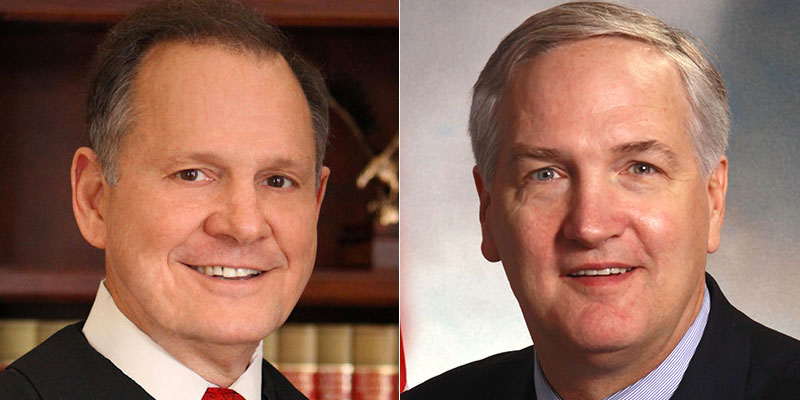
Some say Judge Roy Moore’s victory over Senator Luther Strange last Tuesday was a loss for the president: “Alabama defeat leaves Trump weakened, isolated amid mounting challenges,” read a headline in the Washington Post.
Others say it was a defeat for the Senate majority leader: “Judge Roy Moore wins Alabama Senate primary, dealing a huge blow to Mitch McConnell,” declared the liberal news site Vox.
And a few even say it was all about the chairman of Breitbart News: “Steve Bannon just defeated Trump,” wrote liberal columnist E.J. Dionne Jr.
But this wasn’t about Trump or McConnell or Bannon, and it wasn’t even really about Moore or Strange.
It was about Alabama.
More precisely, it was about how Republicans in Alabama choose candidates to stand against Democrats in the general election, and then against liberalism once in office.
But if we allow a proxy war between Trump and McConnell and Bannon and whoever else to distract us, then we’ll fail to learn some valuable lessons that tumbled out of this messy but instructive race. It’d be foolish to repeat these mistakes in another Republican primary, but it could be catastrophic to do so during a general election.
So let’s remind ourselves of three big ones:
Lesson 1: Never disrespect the voters.
Like many Republicans in Alabama, I had a somewhat open mind at the beginning of the primary. And there was plenty to like.
If you like former Senator Jeff Sessions, then you’d probably love Congressman Mo Brooks. He’d carry the torch of conservatism in the Senate. If you like Senator Richard Shelby, then you’d probably love Luther. He’d protect the state’s interest and bring home jobs. Those who like Donald Trump would probably love Judge Moore. He’d give the establishment hell.
I honestly couldn’t decide … until an outside group supporting Luther released an attack ad against Brooks. And someone thought it’d be a good idea to ask veterans to carry the message.“I served my country,” said one veteran. “Mo Brooks, he voted to cut off funding to fight ISIS.” “We fought for our freedom,” said another. “Brooks, he fought to cut off funding.” “Mo Brooks was playing politics,” they went on to say, “siding with Nancy Pelosi and the liberals instead of siding with us.”Luther lost me in the primary because of that ad. Instantly.
First, because claiming that Mo Brooks was siding with Nancy Pelosi on anything is the dumbest thing I’ve ever heard. He’s one of the most consistently conservative voices in Congress. Hit him on whatever else – being a lifelong politician, not jumping on the Trump Train, etc. – but cozying up to liberals? Come on.
Second, they gave those veterans a script that did more than stretch the truth, and then put them on television. I respect those veterans. They’re my brothers-in-arms, but I fear they were manipulated. That turned me from annoyed to angry.
Then later during the run-off, I had to listen to another ad supporting Luther, this time saying how strong he is on the Second Amendment (which indeed he is). But then they had to blow it with another unnecessary jab.
“Roy Moore,” the narrator said, “He’s a little soft on gun rights.”
Luther lost me in the runoff because of that ad. Permanently.
There’s plenty of truthful material to use against Moore, but claiming he’s “soft” on guns was the dumbest thing I had heard since … well … someone said Mo Brooks was in cahoots with Nancy Pelosi. Do they really think we’re that stupid?
Luther’s outside supporters meant well, but they couldn’t have caused a worse reaction with the voters they were seeking to influence. I saw otherwise calm people grow red-faced with anger about those ads.Not because of where they came from. Not because they were negative, per se. But because they were taking cheap shots at well liked, and well known, conservatives.
It seems like Alabamians know Mo Brooks and Judge Moore much better than the people who created those ads. We not only felt they were being unfair to two of our movement’s most unwavering conservatives, they were insulting our intelligence by claiming they were liberals or gun grabbers.
Listen, the organizations that funded those ads are full of dedicated conservatives. Good people. Our people. And the firms that cut those ads have talented and dedicated experts who can produce amazing spots. I’m sure they poll-tested and focused-grouped the language and think all of this criticism is unfounded. Maybe ads like that worked well elsewhere in the past. But the results speak for themselves.
We can, and must, attack our opponents. Early, often, and without rest. But it must be done with integrity. Doing the research, formulating the right argument, and writing clever copy for an honest yet effective attack will be harder, but the result will be much better.
At least do this: Our ad guys should adopt that old saying from the Hippocratic Oath: First, do no harm.
Lesson 2: Negative ads still work.
Yes, those ads backfired and drove voters away from Luther, but we mustn’t believe that negative ads don’t work at all. They’re proven to be effective when done correctly, and proven to fail when not done at all.
In 2008, Senator John McCain refused to launch negative ads against then-Senator Barrack Obama until it was too late. Four years later Mitt Romney did the same thing. They played nice, and lost. Remember how we complained about that?
Besides, successfully launching and withstanding negative ads during a primary fight also shows us who can throw a punch and who can take a punch. Republicans need proven fighters and tested survivors, or else our candidates will get hammered in the general election by the Democrats (who will attack, and harshly).
Why this would normally matter: Judge Moore proved once again that he could take a punch, probably better than anyone. Steadfast doesn’t begin to describe the man. But since some voters were primarily driven into his camp by the other guy’s campaign ads, did he demonstrate an ability to effectively counterpunch? He’ll need to do that during the general election, and the time for practice has passed.
But why it doesn’t matter at all right now: Judge Moore’s opponent in the general election just said he thinks it should be perfectly legal to abort an unborn baby at any time during pregnancy, even a few minutes before birth. No restrictions. Oh, and taxpayers should fund it, he says. It’s hard to believe that my grandfather’s party nominated this guy. The only question that remains, does Roy Moore want us to still call him “judge” or will “senator” do?
Bottom line: If our future candidates walk away from this primary thinking they shouldn’t use negative ads, then they’ll follow McCain and Romney straight into the loser’s club.
Lesson 3: You’re the candidate, so control your message.
When asked by reporters, Luther would correctly say that he had nothing to do with those ads, they weren’t created or funded by his campaign, and that he couldn’t legally coordinate with the committee that produced them.
That’s all true, legally speaking. But voters still held Luther responsible for the ads because they knew he could have done something. Hearing him claim he was powerless to make them stop seemed rather unbelievable.
A couple of years ago when Congressman Gary Palmer was running for his seat, an outside group came into Birmingham and ran a misleading ad against his opponent. Palmer could have sat by and allowed the ad to continue, and remained within the law, but he made it known publically that he thought the ad was misleading. He didn’t coordinate with the outside group. He simply voiced his distaste with the ad like everyone else.
Guess what? The group heard Palmer loud-and-clear, and they pulled the ad.
Hearing Palmer say that pulled me strongly to his side. Hearing Luther say nothing pushed me further away.
Still, even if it were true that Luther couldn’t say anything to cause those outside groups to pull their insulting ads, what does that say about his ability to influence things on Capitol Hill? It begs the question, if Luther couldn’t get his friends to pull a bad ad that was insulting his voters, then how could we expect him to convince his opponents to repeal a bad law that was harming his state?
How to avoid this: Congressman Palmer showed us the way. The second an outside group strays from a campaign’s messaging strategy or releases a misleading ad, candidates should immediately make their displeasure publically known.
An old soldier once told me that there’s a big difference between a lesson learned and a lesson observed.
We observed these lessons during the past several weeks, but will we truly learn them? Time will tell.
Meanwhile, what other lessons did you take from the primary? Let us know in the comments, on Facebook, or Twitter.
(“Be bold and courageous.” – Joshua 1:9)
###
About the Author: Pepper Bryars is the new editor of Yellowhammer News. Pepper began his career writing for military newspapers while serving in the Alabama Army National Guard. He then became a staff reporter for the Mobile Press-Register, spent time as an aide to then-Congressman and Governor Bob Riley and served as a presidential appointee managing legislative issues for the Defense Department. Pepper was also a strategic communication advisor to U.S. military forces operating in Europe, Africa, and Latin America. He was twice awarded the Office of the Secretary of Defense Award for Exceptional Public Service, once for service in Baghdad during the early days of the Iraq War and a second time for work at the Pentagon. He is the author of two books and most recently wrote a popular conservative opinion column that was published in the Birmingham News, Mobile Press-Register, Huntsville Times, the Mississippi Press and at AL.com.












